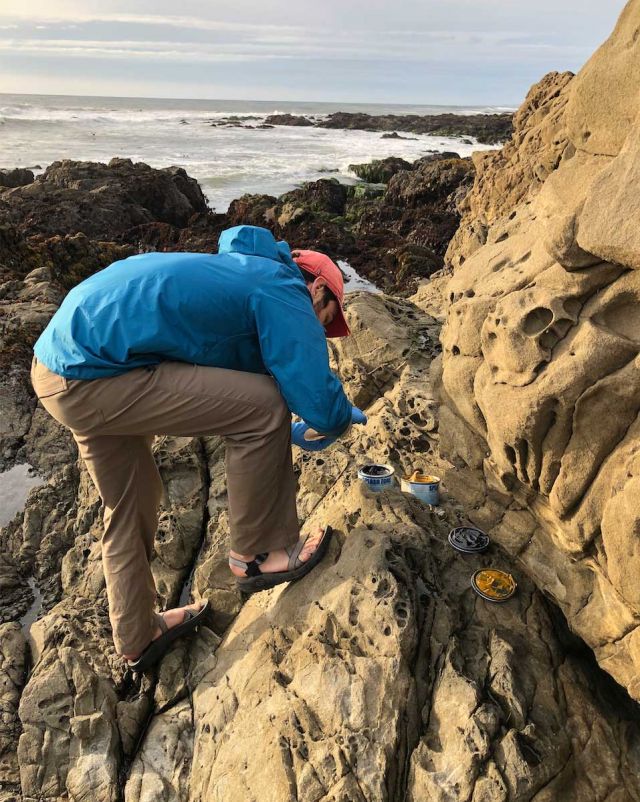Overview
Epigenetics can be broadly defined as a concert of pre- and post-transcriptional processes that regulate the expression of genotype as phenotype, acting as a 'middle man' between DNA and corresponding traits. Our lab has recently begun to integrate analyses of DNA methylation into our investigations of marine metazoans' potential to acclimatize and/or adapt to global change. Specifically, we are exploring the role of DNA methylation in (i) transgenerational plasticity, (ii) transcriptomic responses to stress, and (iii) local adaptation to environmental gradients. These studies include a combination of whole-genome estimations of DNA methylation, bisulfite sequencing, and transcriptomics.
One avenue through which we are studying environmental epigenetics is the process of transgenerational plasticity: the influence of parental environment on offspring performance. Through a series of NSF-funded projects focused on the purple sea urchin Strongylocentrous purpuratus as a model system, we have tested whether maternal conditioning to simulated upwelling during gametogenesis induces variation in DNA methylation, gene expression, and the organismal performance of offspring larvae. Ongoing investigations include efforts to (i) assess the epigenetic inheritance of paternal DNA methylation and its influence on TGP and (ii) further understand the complex relationship between DNA methylation and gene expression in the purple urchin.

Research Highlight
Members of the lab are also interested in the epigenetic basis of variation in plasticity in natural populations, especially across biogeographical distributions or across large environmental gradients such as that observed in the rocky intertidal zone. Past research has shown that natural populations distributed across environmental gradients can exhibit striking phenotypic variation as the result of acclimation and adaptation, including variation in the strength of phenotypic plasticity (developmental and/or transgenerational). One current project in the lab focuses on quantifying the influence of epigenetic mechanisms such as DNA methylation upon these processes. A PhD student in the lab, Sam Bogan, is studying how inter-population genetic variation influences genomic methylation, gene expression, and plasticity across populations of the intertidal copepod Tigriopus californicus that are locally adapted across a latitudinal gradient. Sam is working to collect temperature data from his field sites and to use lab experiments to address his primary research questions.
Affiliated Researchers
Selected Publications
Strader, M.E., Kozal, L.C., Leach, T.S., Wong, J.M., Chamorro, J.D., Housh, M.J., and Hofmann, G.E. (2020). Examining the Role of DNA Methylation in Transcriptomic Plasticity of Early Stage Sea Urchins: Developmental and Maternal Effects in a Kelp Forest Herbivore. Frontiers in Marine Science 7.
Bogan, S.N., K.M. Johnson and G.E. Hofmann (2020) Changes in Genome-wide Methylation and Gene Expression in Response to Future pCO2 Extremes in the Antarctic Pteropod Limacina helicina antarctica. Frontiers in Marine Science 6: 788
Strader, M.E., J.M. Wong, L.C. Kozal, T.S. Leach, and G.E. Hofmann (2019) Parental environments alter DNA methylation in offspring of the purple sea urchin, Strongylocentrotus purpuratus. Journal of Experimental Marine Biology and Ecology 517: 54-64.
Hofmann, G.E. (2017) Ecological epigenetics in marine metazoans. Frontiers in Marine Science 4: doi: 10.3389/fmars.2017.00004.
